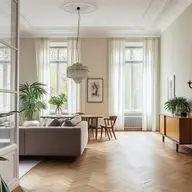
- 3 min read
- 12.11.2018
What to consider when letting furnished apartments
&w=1920&q=75)
To furnish or not to furnish? As a landlord, it’s one of the key questions. If you’re wondering whether or not you need to invest in some furniture for your property before you rent out, there are a few things you need to consider so you can make the right decision.
What does furnished mean?
The term ‘furnished’ is a blanket expression that doesn’t necessarily mean the same thing to everyone – depending on whether you’re talking to tenants, agents or property owners, you’re likely to find many different interpretations.
A property that’s furnished may simply have the basics, such as furniture for sleeping, sitting and eating. But it could also mean all white goods are provided, so tenants might expect a fridge, freezer, washing machine and dryer as well. And at the most complete end, it could also mean finishing touches like artwork, as well as other home comforts – just as you’d expect in a holiday home or hotel.
Who prefers furnished apartments?
Furnished apartments usually appeal to tenants in very specific circumstances. Anyone who has moved a long way, perhaps from abroad, and hasn’t brought furniture with them is likely to be looking for a furnished property when they arrive.
Within this category there are expats, for example, who might not want to ship all their furniture with them for the time they’re away. People who move frequently for work or are visiting temporarily on business are also unlikely to bring furniture with them and will not want to spare the time to furnish the space.
This category of tenants tends not to rent long term, which does create more administrative work for you as a landlord. However, they also tend to be fairly affluent, as well as willing to spend more for comfort and convenience. Therefore, quality is key; although your initial outlay may be higher, investing in well-made furniture and thoughtful interior design will allow you to charge a higher rent and so achieve a healthy return on investment.
Another important category of tenants for furnished apartments is the student market. Generally on a budget and only in an area for a year or two, they will normally expect everything to be ready for them when they move into their new place. This means providing desks and potentially even kitchen equipment like kettles, toasters and white goods to make a property ready to live in immediately. If you’re looking to attract student tenants, you might want to furnish on a budget to keep costs low for both you and your tenants.
What precautions should you take?
You should always insure your furniture against damage. A certain level of wear and tear is inevitable, but you don’t want to suffer financially for any irregular use that leads to replacements being needed. When buying any soft furnishings, make sure all relevant items are fire-safety compliant.
Nothing you furnish the house with should be rare or irreplaceable, so no heirlooms or anything of particular personal value. Likewise, you should try to make sure there’s nothing inside that can be easily damaged or quickly broken.
Although furnishing an apartment is more of an investment upfront, it also makes your property more attractive to the large number of people looking for a short-term let and a quick turnaround.
You may also be interested in
 Floor plan: Everything important about planning, creation, and interpretation
Floor plan: Everything important about planning, creation, and interpretation Sustainability & ESG in Real Estate: What You need to know
Sustainability & ESG in Real Estate: What You need to know- 3 min.
- 30.04.2025
 Positive news from the residential real estate market
Positive news from the residential real estate market&w=1920&q=75) Future-proof property 2026
Future-proof property 2026- 5 min.
- 23.01.2026
 Individual renovation roadmap
Individual renovation roadmap Engel & Völkers cooperates with service provider Enter: Energy advice for homeowners in Germany
Engel & Völkers cooperates with service provider Enter: Energy advice for homeowners in Germany&w=1920&q=75) Dubai property prices: Demand drives prices up
Dubai property prices: Demand drives prices up- 4 min.
- 27.09.2024
 Zurich real estate prices: Stable market, high demand
Zurich real estate prices: Stable market, high demand- 5 min.
- 16.12.2024
Contact
Contact your personal advisor


Engel & Völkers Germany
Vancouverstraße 2a
20457 Hamburg, Germany
Tel: +49 40 361310